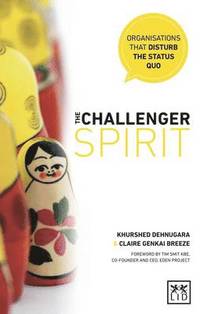The Challenger Spirit by Dehnugara and Genkai Breeze
The value of resilience, and purposeful instability…
The focus of this well-written book is creating successful, innovative organisations, and the personal skills to enable this. The authors are co-founders of Relume, a small team who have helped top businesses for many years. Claire Genkai Breeze draws heavily on her Zen Buddhist training in her approach.
 The book offers a series of key skills and principles to bring the Challenger Spirit into an organisation and each chapter has a good Practice Ground section, highlighting inner and outer work, and describing what good would look like. The book is also bought to life by a series of excellent quotes and mini case histories from named organisations.
The book offers a series of key skills and principles to bring the Challenger Spirit into an organisation and each chapter has a good Practice Ground section, highlighting inner and outer work, and describing what good would look like. The book is also bought to life by a series of excellent quotes and mini case histories from named organisations.
They are clear that changing attitudes, culture and values are fundamental, rather than large change programmes of pre-designed activity. As one quote puts it: “As well as a ‘to do’ list we also had a kind of ‘to be’ list. Which was about how we related to each other… what we valued as a company… That really has been the enduring stuff and the least comfortable.” (Director of a financial services company)
The book is perceptive about ways that Establishment organisations blinker themselves, including the 4 A’s:
- Arrogance
- Avoidance
- Antagonism (energy-consuming dynamic of ‘sides’)
- Agreement (can mean oversimplifying, not facing real issue)
 One of the powerful elements in the Challenger Spirit is Purposeful Instability: in other words deliberately cultivating a degree of challenge and change, which puts the organisation and its individuals into a growth zone somewhere between chaos and the status quo. This instability is only fruitful if matched with a range of other skills, such as drawing out the vision and ambition of the individuals within the organisation, and real learning skills.
One of the powerful elements in the Challenger Spirit is Purposeful Instability: in other words deliberately cultivating a degree of challenge and change, which puts the organisation and its individuals into a growth zone somewhere between chaos and the status quo. This instability is only fruitful if matched with a range of other skills, such as drawing out the vision and ambition of the individuals within the organisation, and real learning skills.
Chapter 7 is all about resilience, and offers some great guidelines especially for those in leadership or management roles, who need even more resilience than the rest of us. Some of the key points are:
- Handling stress and having negative feelings directed at you require very high resilience skills.
- High personal resilience is crucial if you are aiming to create and grow through instability in a work organisation.
- Maintaining momentum, repeatedly stretching the organisation, demands a lot of energy.
- Emotional competence – handling your own and others’ emotions, is vital.
- There will be periods of ‘no hope’ when it seems a situation or project has failed – handling these is a crucial part of individual and team resilience: see these as transformational opportunities.
 The key skills for resilience listed in the book relate closely to mindfulness, but expand on it, including:
The key skills for resilience listed in the book relate closely to mindfulness, but expand on it, including:
Managing stress reactions, maintaining mindfulness in hectic contexts; challenging their own and others’ habitual responses; staying connected to purpose; recognising emergence; embodying compassion.
The main omission which surprised me in this book is any question about the underlying values and purpose of business in general. I believe that innovative businesses can combine their profit goal with a leading role in social responsibility and same approaches to climate change, but none of this is mentioned here.
Although the book’s focus is on organisations, many of the ideas, such as purposeful instability, can be well applied by individuals to their own growth and resilience too.
